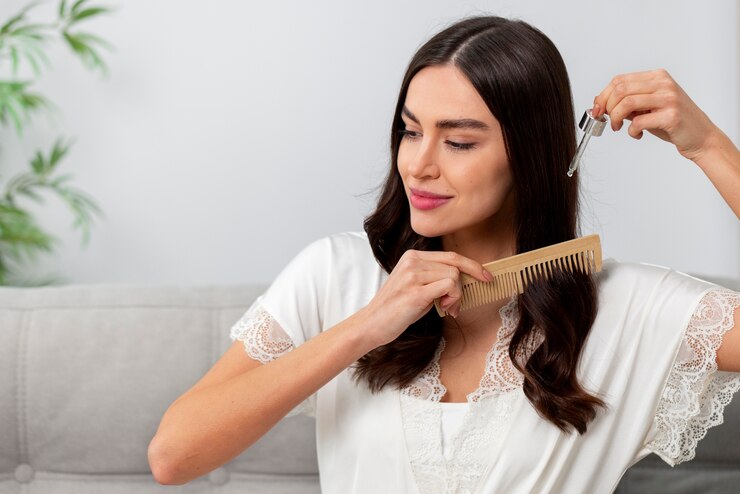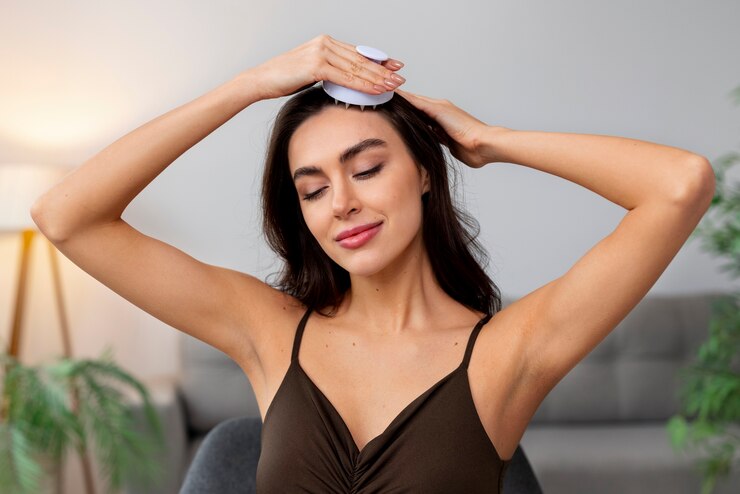
Can You Stop Hair Loss? Exploring Effective Solutions and Tips
admin
- 0
- 18
Yes, you can stop hair loss. Addressing underlying causes and using proven treatments can help.
Hair loss can be a distressing issue for many people, leading to a search for effective solutions. Whether due to genetics, stress, hormonal changes, or other factors, understanding the root cause of hair loss is crucial. By implementing targeted lifestyle changes, using clinically proven treatments, and seeking professional help, individuals can take proactive steps to mitigate and even reverse hair loss.
We will explore various strategies and options available to address hair loss, offering practical insights and actionable tips for effectively managing this common concern. Whether you are experiencing mild thinning or more severe hair loss, understanding your options can help you make informed decisions for healthier, fuller hair.

Table of Contents
ToggleThe Science Behind Hair Loss
Understanding the science behind hair loss is essential for those seeking effective solutions. While hair loss may seem inevitable for some, it’s important to explore the factors contributing to this common concern. By delving into the intricacies of the hair growth cycle and identifying the underlying causes of hair loss, individuals can gain valuable insights into combating this issue.
Hair Growth Cycle
The hair growth cycle comprises three distinct phases:
- Anagen phase: This is the active phase in which hair grows continuously for 2 to 7 years.
- Catagen phase: During this transitional phase lasting 2 to 4 weeks, hair growth ceases and the hair follicle shrinks.
- Telogen phase: Known as the resting phase lasting around 3 months, old hair sheds and new hair begins to grow as the cycle restarts.
Causes Of Hair Loss
Hormonal changes: Fluctuations in hormonal levels, such as those experienced during pregnancy or menopause, can lead to temporary or permanent hair loss.
Genetics: Hereditary factors play a significant role in determining an individual’s susceptibility to hair loss, with conditions like male and female pattern baldness being common examples.
Nutritional deficiencies: Inadequate intake of essential nutrients, particularly iron, protein, and vitamin D, can adversely affect hair health and contribute to hair loss.
Stress: Prolonged stress can disrupt the hair growth cycle, leading to excessive shedding and thinning of the hair.
Medical conditions: Certain medical conditions, including autoimmune disorders and thyroid imbalances, can trigger hair loss as a secondary symptom.
Can You Stop Hair Loss?
Dealing with hair loss can be distressing, but the good news is that there are various lifestyle changes and medical treatments that can help prevent or slow down the loss of hair. By understanding the causes of hair loss and taking proactive steps, many people can effectively manage and address this common issue. Below, we will explore the lifestyle changes and medical treatments that can assist in combating hair loss.
Lifestyle Changes
Adjusting your daily habits and making certain lifestyle modifications can have a positive impact on slowing down hair loss. Incorporating a nutritious diet rich in vitamins and minerals such as vitamin A, B, C, iron, and zinc can promote hair health and reduce the risk of hair loss. Additionally, managing stress levels through activities like meditation, yoga, or regular exercise can help prevent stress-related hair thinning. Other lifestyle changes such as avoiding tight hairstyles and overusing heating tools can also contribute to preserving hair health.
Medical Treatments
For individuals experiencing more severe hair loss, there are medical treatments available that have shown to be effective in combating this issue. Topical treatments like minoxidil can help stimulate hair growth, while oral medications such as finasteride may also be prescribed by a healthcare professional. In some cases, hair transplant procedures can provide long-term results for individuals with advanced hair loss. Consulting with a dermatologist or hair specialist can ensure the most suitable medical treatment for individual needs.
Natural Remedies For Hair Loss
When it comes to addressing hair loss, many individuals seek natural remedies as part of their journey to regaining hair health. While seeing a healthcare professional is recommended for a thorough assessment and guidance, incorporating natural remedies as part of a holistic approach can be beneficial. Here, we explore some effective natural remedies for hair loss, including diet and nutrition and herbal treatments.
Diet And Nutrition
Diet plays a crucial role in maintaining healthy hair. A well-balanced diet rich in the following nutrients can help in preventing hair loss:
- Vitamin A: promotes healthy production of sebum in the scalp
- Vitamin B7 (biotin): aids in the strengthening of hair
- Vitamin E: helps in improving blood circulation to the scalp
- Omega-3 fatty acids: contribute to scalp health
- Protein: vital for hair growth
Additionally, incorporating foods such as spinach, nuts, eggs, and fatty fish into your diet can be beneficial for maintaining healthy hair.
Herbal Treatments
Several herbal treatments have been found to be beneficial in combating hair loss. Some popular herbal remedies include:
- Amla (Indian Gooseberry): Rich in vitamin C, amla helps in strengthening hair follicles.
- Rosemary: Known for its stimulating properties, rosemary oil can help in increasing blood circulation to the scalp.
- Saw palmetto: This herb may help in blocking the formation of DHT, a hormone linked to hair loss.
When using herbal treatments, it is important to consult with a healthcare professional to ensure their safety and efficacy.
Preventing Future Hair Loss
Fight hair loss with effective preventative measures. Embrace a balanced diet, reduce stress, and seek professional advice. Take proactive steps to stop hair loss before it becomes a concern.
Scalp Care
Proper scalp care is essential for preventing future hair loss. Regularly cleansing the scalp with mild shampoos can help remove excess oils and impurities that may clog hair follicles, leading to hair loss. Massaging the scalp stimulates blood flow and promotes overall hair health. Additionally, using a conditioner specifically designed for the scalp can help maintain a healthy environment for hair growth.
Hair Styling Tips
When it comes to preventing hair loss, hair styling habits play a significant role. Avoiding tight hairstyles that put excessive tension on the hair can prevent damage and breakage. Using heat-protectant products before styling with heat tools can help minimize damage to the hair shaft. Choosing gentle hair accessories and avoiding harsh chemical treatments can also contribute to preserving hair health.
Frequently Asked Questions On Can You Stop Hair Loss?
Can Hair Loss Be Reversed?
Hair loss can be reversed with the right treatment, such as topical solutions, medication, and lifestyle changes. It’s important to address the underlying cause and consult with a healthcare professional for personalized advice.
What Are The Common Causes Of Hair Loss?
Common causes of hair loss include genetics, hormonal changes, stress, poor nutrition, and certain medical conditions. Understanding the cause is crucial in determining the most effective treatment to address the hair loss issue.
How Can I Prevent Hair Loss?
Preventing hair loss involves maintaining a balanced diet, managing stress, using gentle hair care products, and avoiding excessive heat or chemical treatments. Additionally, regular scalp massages and proper hydration can help promote hair health and reduce the risk of hair loss.
Conclusion
In essence, effective hair loss prevention requires a multifaceted approach encompassing lifestyle changes, proper nutrition, and personalized treatments. By understanding the underlying causes and diligently implementing tailored strategies, one can potentially slow down or even stop hair loss. With the right knowledge and commitment, regaining control over hair loss is within reach.



